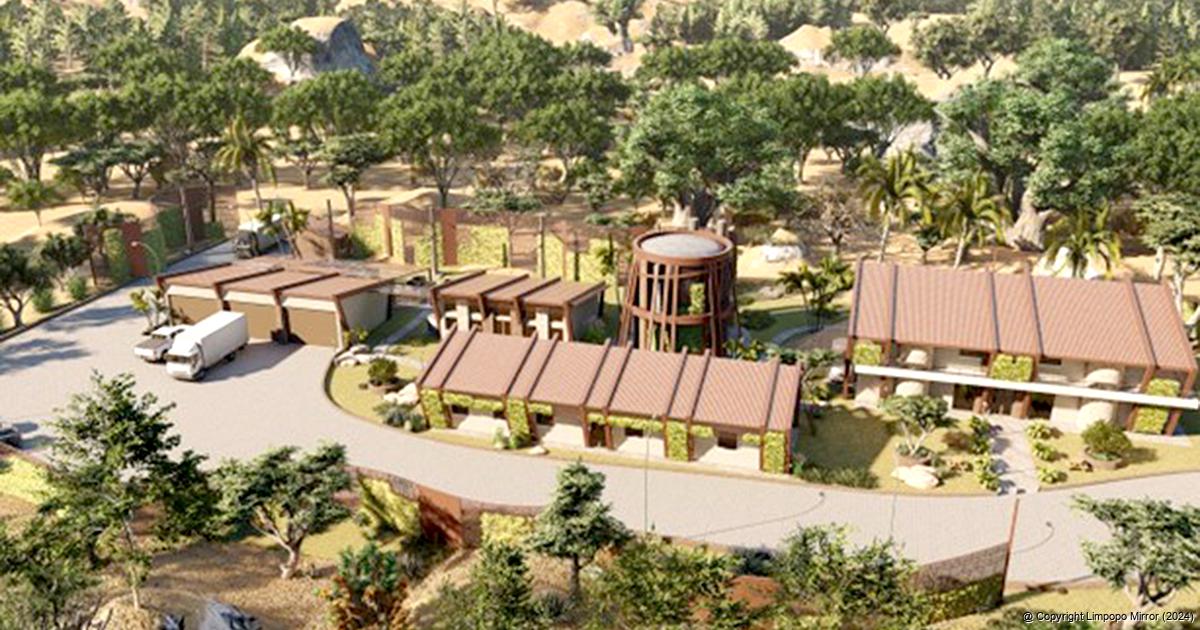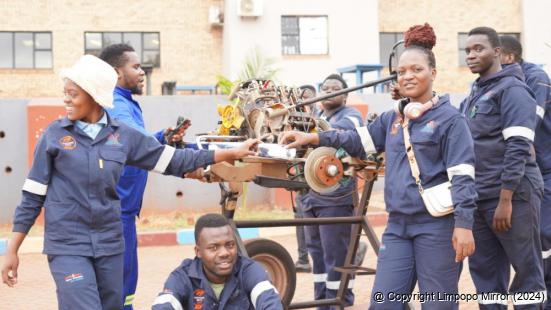

ADVERTISEMENT:

Architect Johann Koch of JKDA has designed an African HTMR-100 themed exterior for the South African designed SMR, the HTMR-100. Image supplied.
No deal or agreement reached regarding nuclear power for MMSEZ
The CEO of the Musina Makhado Special Economic Zone (MMSEZ), Mr Lehlogonolo Masoga, has categorically stated that no deal or agreement had been signed between the MMSEZ and Stratek Global regarding the possible use of small, modular nuclear reactors (SMRs) to power the proposed development.
“We are having a conversation with them about exploring various options provided for in the Integrated Resource Plan (IRP) as approved by the national government to find a solution for the security of power supply to the MMSEZ, and there is no need for anyone to be alarmed,” was Masoga’s written response to media questions sent to him by this newspaper.
The media enquiry to Masoga was sparked by a letter received from Ms Olivia Vaughan, who is part of a consortium with Black Mountain Investment Management, a 100% black-owned registered financial-services provider and lead fund arranger for Stratek Global.
Vaughan reacted to the article “MMSEZ looks at nuclear power to feed mega development” as it appeared in both the Zoutpansberger and Limpopo Mirror newspaper in April this year.
“While scepticism from local communities and environmental groups is understandable, it's crucial to consider the broader implications of this decision, particularly regarding economic growth, environmental sustainability, and community development,” said Vaughan in her response.
Vaughan stated that Limpopo epitomised the delicate dance between “environmental protection and ensuring human prosperity.” “It should be a given that its rich natural resources, including fertile agricultural land and diverse ecosystems, highlight the importance of environmental conservation for sustaining livelihoods and the environment in the region. However, the pursuit of economic development and job creation often presents competing interests, as seen in industries like mining and energy production,” said Vaughan.
“My stance is to promote access to energy, infrastructure, and financial inclusion through economic development, in a manner that respects both people and the environment. There is no other way to long-term prosperity. There are no shortcuts. Every time you sip your morning coffee, think about the energy it took to boil the water and consider how different your life would be if you had to first collect the firewood, make the fire, and not simply turn on a plug. Activism without the measure of an outcome leads to entropy, which is the natural inclination of universal order towards chaos,” said Vaughan.
Vaughan explained that in South Africa, Stratek Global, a private consortium of professionals, has developed a helium-cooled pebble-bed modular reactor called the HTMR-100. “This is the proposed SMR for the Limpopo region,” said Vaughan. She added that they were approached by the Limpopo government to supply information on a clean energy solution for the MMSEZ about nine or ten months ago. “The executive management attended a very well-organised conference in the province alongside many other local and international stakeholders and potential funders who were present. Stratek supplied technical information as requested. There have been numerous RFIs (requests for information), which Stratek has replied to both locally and internationally,” said Vaughan.
Vaughan stated that the argument that the MMSEZ is inherently bad is silly. “One simply needs to look at the unemployment rate in the province to appreciate that it is the root of most environmental and social degradation. In order to alleviate this, the economy needs to be stimulated, and natural resources, including the provision of reliable energy, must be revered as keys to the proverbial economic jewels,” said Vaughan.
“The Chair of Stratek, Dr Kelvin Kemm, is a globally respected nuclear physicist, was previously the Chair of NECSA, and has advised international governments and institutions for many years. This is also well documented and a matter of public record,” said Vaughan. She also expressed her willingness to engage with environmental groups and others in Limpopo to create value for all South Africans. “I welcome open and robust engagement in this regard,” said Vaughan.
Date:12 July 2024
By: Andries van Zyl
Andries joined the Zoutpansberger and Limpopo Mirror in April 1993 as a darkroom assistant. Within a couple of months he moved over to the production side of the newspaper and eventually doubled as a reporter. In 1995 he left the newspaper group and travelled overseas for a couple of months. In 1996, Andries rejoined the Zoutpansberger as a reporter. In August 2002, he was appointed as News Editor of the Zoutpansberger, a position he holds until today.
Read: 2942

ADVERTISEMENT

ADVERTISEMENT:

Sponsored Content
Embracing the Future with Artisanal Skills
As South Africa continues its pursuit of economic growth and industrial sustainability, attention is being drawn to a crucial yet often overlooked segment of the workforce: artisans. Acknowledging this need, the Manufacturing, Engineering and Related Services Sector Education and Training Authority (merSETA) has become a major role player in the Decade of the Artisan (DoA) initiative of the Department of Higher Education and Training (DHET).

ADVERTISEMENT:

Recent Articles
-

New Premier Hotel a testimony of what women leaders can achieve
07 September 2024 -

Seven years of promises but still no stadium at Waterval
07 September 2024 -

Cyria calling on music lovers to buy Royal Heritage tickets
07 September 2024 By Kaizer Nengovhela -

AG’s findings show the good, bad and downright ugly in Vhembe’s municipalities
07 September 2024 By Anton van Zyl -

Sinthumulekutama ladies aim for promotion
06 September 2024 By Kaizer Nengovhela

ADVERTISEMENT

Popular Articles
-

Vhavenda princess' case is set to break traditional stereotypes
03 August 2024 By Anton van Zyl -

Death of popular Venda soapie Muvhango comes as a shock
13 July 2024 By Victor Mukwevho -

Hillary Construction to rehabilitate old N1 through Musina
22 August 2024 -

Man dies in head-on collision near Gogobole
01 August 2024 By Kaizer Nengovhela -

MMSEZ pushes for township development
12 July 2024 By Andries van Zyl -

Sheryl chosen again to represent Team SA at Paris Paralympics
12 July 2024 By Andries van Zyl -

From engineering dreams to fashion industry icon
25 August 2024 By Maanda Bele


